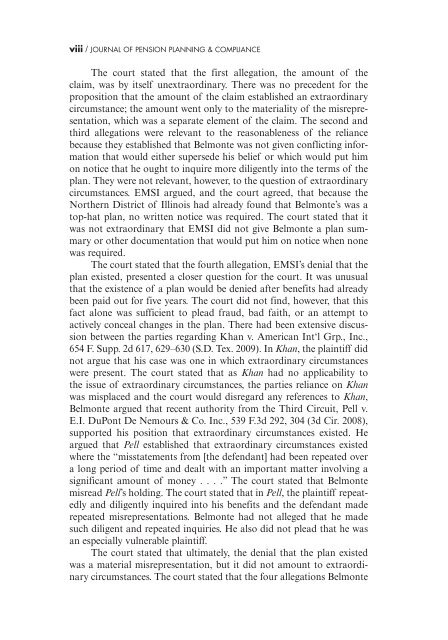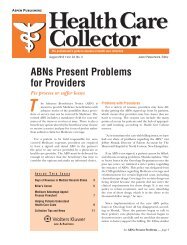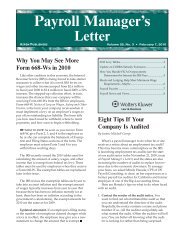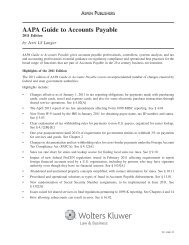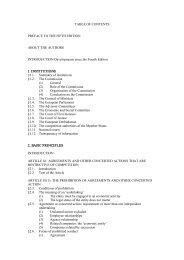journal of pension planning & compliance - Kluwer Law International
journal of pension planning & compliance - Kluwer Law International
journal of pension planning & compliance - Kluwer Law International
Create successful ePaper yourself
Turn your PDF publications into a flip-book with our unique Google optimized e-Paper software.
viii / JOURNAL OF PENSION PLANNING & COMPLIANCE<br />
The court stated that the first allegation, the amount <strong>of</strong> the<br />
claim, was by itself unextraordinary. There was no precedent for the<br />
proposition that the amount <strong>of</strong> the claim established an extraordinary<br />
circumstance; the amount went only to the materiality <strong>of</strong> the misrepresentation,<br />
which was a separate element <strong>of</strong> the claim. The second and<br />
third allegations were relevant to the reasonableness <strong>of</strong> the reliance<br />
because they established that Belmonte was not given conflicting information<br />
that would either supersede his belief or which would put him<br />
on notice that he ought to inquire more diligently into the terms <strong>of</strong> the<br />
plan. They were not relevant, however, to the question <strong>of</strong> extraordinary<br />
circumstances. EMSI argued, and the court agreed, that because the<br />
Northern District <strong>of</strong> Illinois had already found that Belmonte’s was a<br />
top-hat plan, no written notice was required. The court stated that it<br />
was not extraordinary that EMSI did not give Belmonte a plan summary<br />
or other documentation that would put him on notice when none<br />
was required.<br />
The court stated that the fourth allegation, EMSI’s denial that the<br />
plan existed, presented a closer question for the court. It was unusual<br />
that the existence <strong>of</strong> a plan would be denied after benefits had already<br />
been paid out for five years. The court did not find, however, that this<br />
fact alone was sufficient to plead fraud, bad faith, or an attempt to<br />
actively conceal changes in the plan. There had been extensive discussion<br />
between the parties regarding Khan v. American Int‘l Grp., Inc.,<br />
654 F. Supp. 2d 617, 629–630 (S.D. Tex. 2009). In Khan , the plaintiff did<br />
not argue that his case was one in which extraordinary circumstances<br />
were present. The court stated that as Khan had no applicability to<br />
the issue <strong>of</strong> extraordinary circumstances, the parties reliance on Khan<br />
was misplaced and the court would disregard any references to Khan ,<br />
Belmonte argued that recent authority from the Third Circuit, Pell v.<br />
E.I. DuPont De Nemours & Co. Inc., 539 F.3d 292, 304 (3d Cir. 2008),<br />
supported his position that extraordinary circumstances existed. He<br />
argued that Pell established that extraordinary circumstances existed<br />
where the “misstatements from [the defendant] had been repeated over<br />
a long period <strong>of</strong> time and dealt with an important matter involving a<br />
significant amount <strong>of</strong> money . . . .” The court stated that Belmonte<br />
misread Pell ’s holding. The court stated that in Pell , the plaintiff repeatedly<br />
and diligently inquired into his benefits and the defendant made<br />
repeated misrepresentations. Belmonte had not alleged that he made<br />
such diligent and repeated inquiries. He also did not plead that he was<br />
an especially vulnerable plaintiff.<br />
The court stated that ultimately, the denial that the plan existed<br />
was a material misrepresentation, but it did not amount to extraordinary<br />
circumstances. The court stated that the four allegations Belmonte


